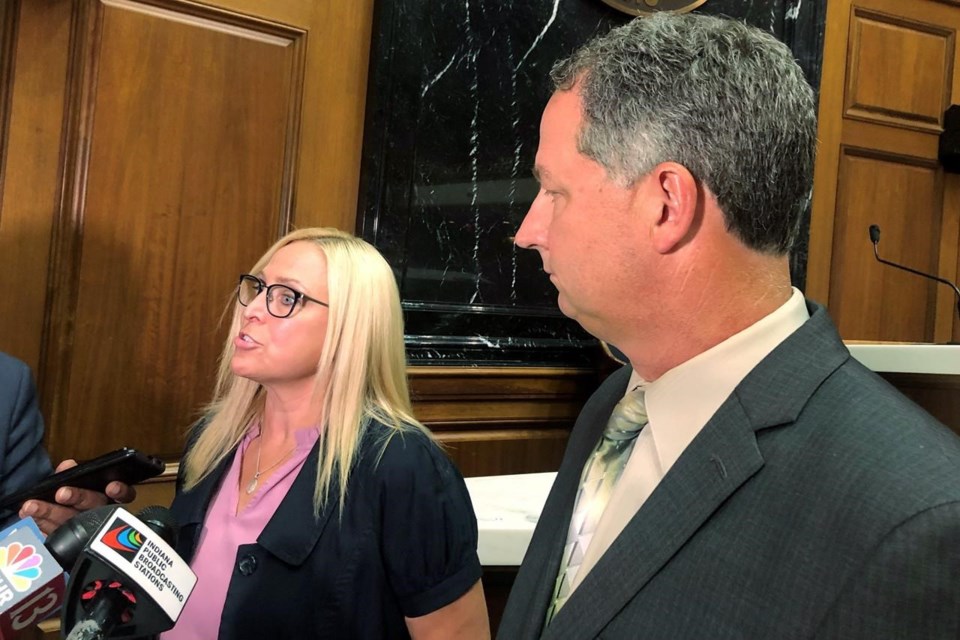INDIANAPOLIS (AP) — Republicans who dominate Indiana’s Legislature remain divided over how tight they should make a proposed ban on nearly all abortions as debate on the bill shifted Monday to the state House following the Senate’s narrow weekend approval of the proposal.
Significant disagreement included whether exceptions to the ban should be a llowed for rape and incest victims, while a prominent House conservative said he believed the version approved by the Senate wouldn’t prohibit as many abortions as claimed by its sponsor.
A House committee is scheduled on Tuesday to hear public testimony on the proposal and possibly debate changes to it ahead of voting on advancing the bill to the full House.
Many anti-abortion activists oppose the version approved Saturday by a 26-20 vote in the Republican-dominated Senate, arguing that it is too lax and objecting to the rape and incest exceptions included in the bill that generally would prohibit abortions from the time a fertilized egg implants in a uterus.
Republican House Speaker Todd Huston and GOP Rep. Wendy McNamara of Evansville, who is sponsoring the bill in the House, both said Monday that they favored allowing those exceptions.
McNamara said the law needed to be “conscientious of those people who experienced trauma in rape and incest situations.”
Indiana has among the first-Republican Legislatures considering tighter abortion laws not already on the books since the U.S. Supreme Court’s decision overturning Roe v. Wade. West Virginia lawmakers passed up the chance Friday to approve an abortion ban that included exceptions for victims of rape and incest, as well as for medical emergencies. That move delayed further action until later in August.
Indiana Republican Rep. Tim Wesco of Osceola said he and other social conservatives would be pushing for removal of the rape and incest exceptions from the bill, along with a tighter definition of what would allowable abortions. Wesco said he didn’t know whether that push would be successful but disagreed with supporters of the bill who maintain it would prohibit nearly all abortions in the state.
“I think the bill it passed out of the Senate and is ineffective and it has some significant problems that potentially even rollback what we have in current law,” Wesco said.
The Indiana proposal followed a political firestorm over a 10-year-old rape victim who traveled to the state from neighboring Ohio to end a pregnancy. The case gained attention when an Indianapolis doctor said the child had to come to Indiana because a newly imposed Ohio law bans abortions if cardiac activity can be detected in an embryo or fetus, possibly as early as six weeks of pregnancy.
Such abortions would still be allowed under the Indiana proposal, though the Senate-approved version limits how long rape and incest victims have to undergo an abortion. Those 16 or older could get an abortion until eight weeks of pregnancy to sign a notarized affidavit attesting to the attack, , while people younger than 16 would have until 12 weeks.
The bill also includes provisions under which doctors could face felony criminal charges and up to six years in prison for performing an illegal abortion. That’s the same potential penalty for performing abortions under Indiana’s current 20-week ban.
Representatives of several medical groups have raised concerns about doctors possibly being questioned and prosecuted over their medical decisions.
The Indiana Hospital Association said in a statement that it was concerned about a new state abortion law “creating an atmosphere that will be perceived as antagonistic to physicians.”
“We caution our public officials from sending signals that could further exacerbate our health care workforce shortage and threaten access to care,” hospital association President Brian Tabor said. “We urge lawmakers to protect all medical professionals from liability and other repercussions when working in good faith to comply with state laws while providing lifesaving care to Hoosier moms and babies.”
Tom Davies, The Associated Press



